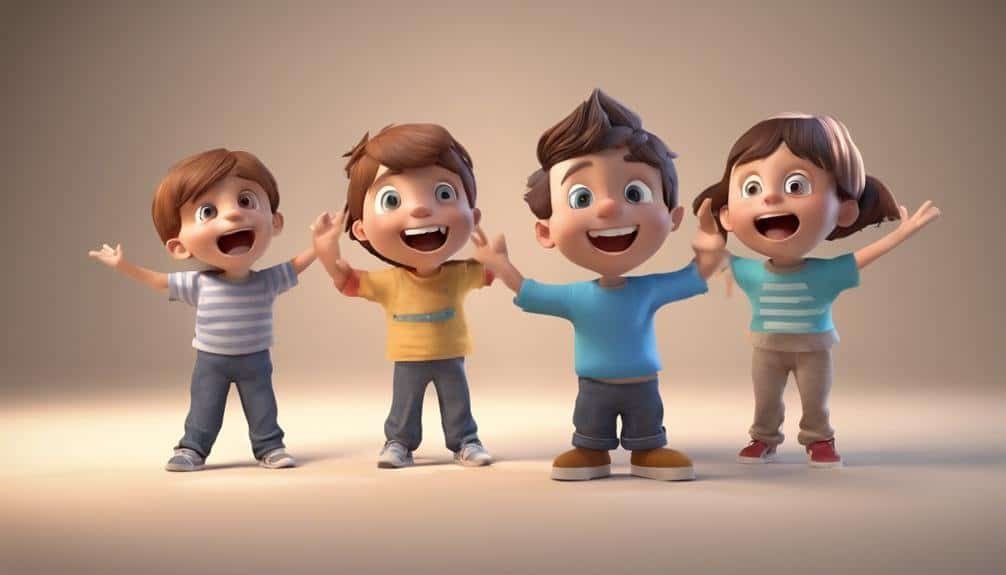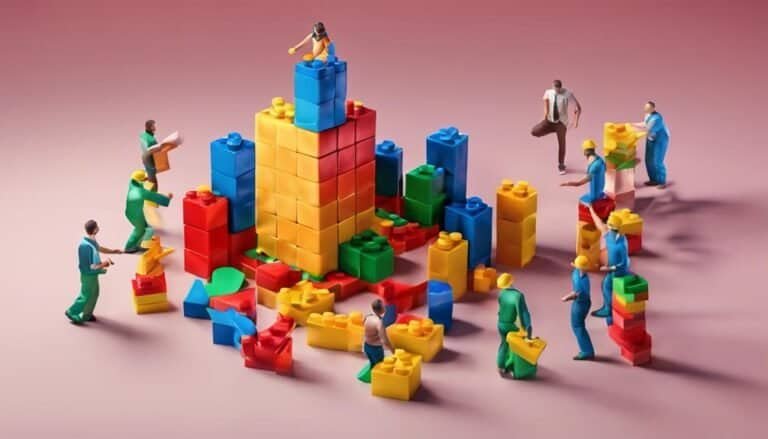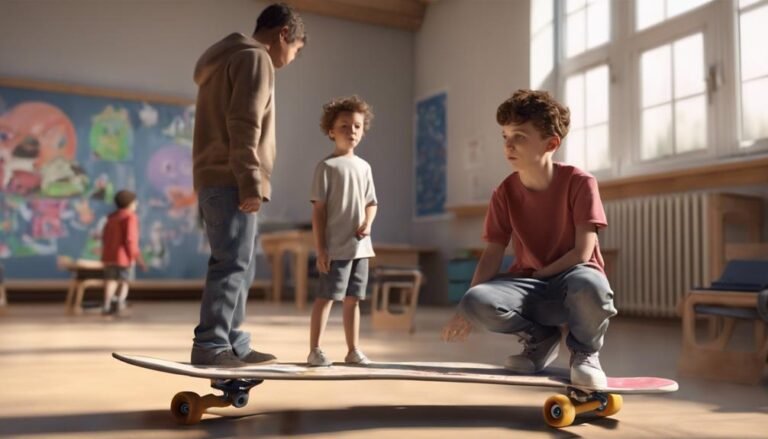15 Communication Games and Activities for Kids and Students
Are you aware that communication games and activities have the ability to transform the way you interact with others?
Engage in a diverse range of interactive exercises that not only enhance your expressive skills but also nurture stronger connections with your peers and mentors.
From creative storytelling and immersive role-playing to challenging debate clubs and empowering leadership activities, there is a wealth of opportunities waiting for you to explore and master.
Discover the secrets behind effective nonverbal cues, active listening techniques, and assertive communication practices as you embark on this enriching journey toward becoming a more confident and eloquent communicator.
Key Takeaways
- Teaching communication skills early improves psychological well-being and reduces negative behaviors.
- Spotting communication difficulties allows for timely intervention and support.
- Engage children in storytelling, role-playing, and group activities to enhance communication.
- Encourage active listening, feedback-seeking, and technology use for better communication skills.
Storytelling and Role-playing Games
Engaging children and students in storytelling and role-playing games fosters creativity, empathy, and effective communication skills. Through improvisation games and character development, children learn the art of creative storytelling, enhancing their social skills.
Research shows that these activities not only stimulate imagination but also promote empathy by allowing individuals to step into different roles and perspectives. By engaging in these games, children develop a deeper understanding of emotions and situations, which translates into improved communication abilities.
Moreover, storytelling and role-playing encourage individuals to express themselves freely, honing their verbal and nonverbal communication skills. The interactive nature of these activities fosters a collaborative environment where children learn to listen, communicate effectively, and work together towards a common goal.
Singing and Puppet Shows
Singing and puppet shows serve as interactive and engaging tools for enhancing communication skills in children and students through creative expression and performance.
Singing workshops provide a platform for individuals to express emotions and ideas through music, improving vocal projection and articulation. Puppetry classes offer opportunities to develop storytelling abilities, nonverbal communication, and teamwork skills as students work together to bring characters to life.
Research indicates that these activities can boost confidence, encourage collaboration, and foster creativity in participants. By participating in singing and puppet shows, children and students not only refine their communication skills but also learn to connect with others in a meaningful and expressive manner, laying a foundation for effective interpersonal interactions.
Building Blocks for Cooperative Play
Building upon the foundational skills developed through activities like singing and puppet shows, cooperative play using building blocks has been identified as a key method for enhancing communication and teamwork among children and students. Engaging in collaborative tasks with building blocks not only fosters creativity but also nurtures essential communication skills. Through problem-solving challenges and group dynamics, children learn to work together, share ideas, and listen to their peers. This form of play encourages team projects where individuals contribute towards a common goal, teaching them the importance of cooperation and effective communication. Below is a table highlighting the significance of building blocks in developing communication and teamwork skills:
| Building Blocks for Cooperative Play | ||
|---|---|---|
| Problem Solving Challenges | Group Dynamics | Collaborative Tasks |
| Enhances critical thinking | Encourages teamwork | Fosters creativity |
| Teaches effective communication | Builds trust among participants | Develops leadership skills |
Charades and Team-building Exercises
Charades and team-building exercises are effective methods for enhancing communication skills and fostering teamwork among individuals of all ages.
Trust exercises such as blindfold games can help build trust and improve nonverbal communication.
Improvisation games encourage quick thinking and creativity, essential for effective communication.
Problem-solving challenges within a team setting promote collaboration and strategic thinking, crucial elements in effective teamwork.
Icebreaker activities like the famous pairs guessing game can help break down barriers and encourage interaction among participants.
Memory Games for Listening Skills
Memory games play a crucial role in enhancing listening skills, fostering attentiveness, and improving cognitive abilities, especially in the context of communication development. Engaging in listening comprehension activities through memory retention exercises can significantly enhance auditory memory challenges and contribute to overall listening skills improvement.
These games require active participation and concentration, forcing the players to retain and recall information accurately. By practicing memory games, individuals can learn to listen more effectively, process information efficiently, and respond appropriately.
Such activities not only enhance communication skills but also aid in developing crucial cognitive functions related to memory and attention, which are essential for effective communication and academic success.
Debate Clubs and Leadership Activities
Debate clubs and leadership activities play a pivotal role in fostering critical thinking skills and nurturing effective communication strategies among students at various educational levels. Engaging in debate clubs helps in honing critical thinking abilities by analyzing different perspectives, constructing arguments, and articulating thoughts persuasively.
These activities also contribute to leadership development by encouraging students to take initiative, collaborate with peers, and make informed decisions. Through participating in debates and leadership tasks, students learn to communicate assertively, listen actively, and work towards common goals.
Such experiences are essential for equipping individuals with the necessary skills to succeed academically, personally, and professionally. Overall, debate clubs and leadership activities serve as valuable platforms for enhancing students’ critical thinking skills and fostering effective communication strategies.
Public Speaking Contests and Peer Mentoring
Public speaking contests and peer mentoring are two impactful avenues for enhancing students’ communication skills and fostering a supportive learning environment. Engaging in public speaking workshops can help students refine their presentation skills, boost confidence, and learn to articulate ideas effectively.
Peer support sessions offer students the opportunity to practice active listening, provide constructive feedback to their peers, and develop empathy and understanding towards others’ perspectives. These activities not only improve communication skills but also promote collaboration, leadership, and emotional intelligence among students.
Networking Events and Business Simulations
Networking events and business simulations play a crucial role in enhancing college students’ practical communication skills and real-world networking abilities. These activities provide valuable opportunities for career development by simulating professional environments, fostering problem-solving strategies, and encouraging students to apply theoretical knowledge in practical scenarios.
By participating in networking events, students can expand their professional connections, practice effective communication techniques, and gain insights into various industries. Business simulations offer a hands-on approach to learning business strategies, decision-making processes, and teamwork dynamics. Through these experiences, students develop critical thinking skills, enhance their adaptability in diverse situations, and prepare for future roles in the workforce.
Communication Workshops and Team-building Retreats
Communication workshops and team-building retreats are crucial for improving interpersonal skills and fostering collaboration among college students. These activities concentrate on refining communication strategies and building vital teamwork skills.
Here are three fundamental aspects to consider when participating in communication workshops and team-building retreats:
- Interactive Exercises: Engage in role-playing scenarios that demand effective communication and teamwork.
- Problem-solving Challenges: Work together with peers to address intricate challenges that necessitate clear communication and cohesive teamwork.
- Feedback Sessions: Offer and receive constructive feedback to enhance communication skills and bolster team dynamics.
Nonverbal Communication Activities
Enhancing interpersonal dynamics and communication skills, nonverbal communication activities play a crucial role in fostering effective interactions and understanding among individuals. Body language exercises and mirror games are key components in improving nonverbal communication skills. These activities help individuals become more aware of the messages conveyed through gestures, facial expressions, and posture. By engaging in body language exercises, participants can learn to interpret and control their nonverbal cues, enhancing their overall communication effectiveness. Mirror games provide a fun and interactive way to practice mirroring others’ movements and expressions, promoting empathy and understanding. Through these activities, individuals can develop a deeper appreciation for the importance of nonverbal communication in daily interactions.
| Nonverbal Communication Activities |
|---|
| Body Language Exercises |
| Mirror Games |
Active Listening Games and Exercises
Engage in various active listening games and exercises to enhance your communication skills and deepen your understanding of others’ perspectives. Active listening is a crucial component in effective communication, allowing you to truly connect with others and build stronger relationships.
Here are three listening exercises to help you hone your active listening skills:
- Listening to Music: Focus on the lyrics, instruments, and emotions conveyed in the music to practice attentive listening.
- Following Verbal Instructions: Pay close attention to details and specific directions to improve your ability to understand and carry out tasks accurately.
- Reflective Listening Exercises: Practice paraphrasing and summarizing what others say to demonstrate understanding and show empathy in conversations.
Assertive Communication Activities for Teens
Assertive communication activities for teens require structured role-playing scenarios to cultivate assertive responses and enhance conflict resolution skills effectively. Engaging in conflict resolution simulations allows teens to practice handling disagreements constructively. Additionally, participating in expressive art workshops provides a creative outlet for teens to communicate their feelings and thoughts. Peer feedback sessions offer valuable insights into refining communication styles, while setting boundaries assertively empowers teens to communicate their needs effectively. These activities aim to equip teens with the necessary skills to navigate interpersonal conflicts confidently and assertively.
| Activity | Description | Benefits |
|---|---|---|
| Role-playing scenarios | Practice assertive responses | Enhances conflict resolution |
| Conflict resolution sims | Learn constructive disagreement management | Develops problem-solving skills |
| Expressive art workshops | Communicate feelings creatively | Encourages emotional expression |
Follow All Instructions Activity
Implementing the ‘Follow All Instructions Activity’ fosters effective communication and promotes mutual understanding among participants through structured engagement with detailed instructions. This activity enhances reading comprehension skills and teamwork dynamics by emphasizing the importance of carefully following directions.
Here are three key components of the activity:
- Reading Comprehension Focus: Participants are required to read and understand all instructions thoroughly before proceeding with the activity.
- Teamwork Dynamics: Collaboration is essential as individuals must communicate effectively to ensure all instructions are followed correctly.
- Critical Thinking Development: This activity challenges participants to think critically and problem-solve to accomplish tasks accurately, fostering a sense of accomplishment and teamwork.
Famous Pairs and The Enigmatic Self
Transitioning from the structured engagement of the ‘Follow All Instructions Activity,’ the exploration of ‘Famous Pairs and The Enigmatic Self’ delves into interactive communication exercises that stimulate introspection and interpersonal connections.
By focusing on famous duos and incorporating a mystery game element, participants are encouraged to reflect on their own identities and relationships. This activity not only promotes teamwork and collaboration but also fosters a deeper understanding of oneself and others.
Through the analysis of famous pairs, individuals can uncover hidden aspects of their personalities and explore the dynamics of successful partnerships. By engaging in this enigmatic self-discovery process, participants enhance their communication skills and develop a greater appreciation for the complexities of human relationships.
The Guessing Game and Study Groups
What’re the key benefits of incorporating ‘The Guessing Game and Study Groups’ into college communication activities and why are they essential for enhancing students’ communication skills? Engaging in these activities fosters essential skills for effective communication and collaboration. Here’s why:
- Group Dynamics: The Guessing Game encourages students to work together, fostering a deeper understanding of group dynamics and enhancing teamwork skills.
- Problem-Solving Strategies: Study Groups provide a platform for students to collectively tackle challenges, promoting critical thinking and developing problem-solving strategies.
- Collaborative Learning: Both activities promote collaborative learning, where students exchange ideas, perspectives, and knowledge, enhancing their overall communication skills through shared experiences.
Conclusion
In conclusion, engaging in communication games and activities is a valuable way for kids and students to enhance their interpersonal skills and build confidence.
By participating in these interactive exercises, individuals can develop a deeper understanding of effective communication techniques and improve their ability to connect with others.
So, don’t be a square, jump on the bandwagon and start honing your communication prowess through these fun and engaging activities today!







